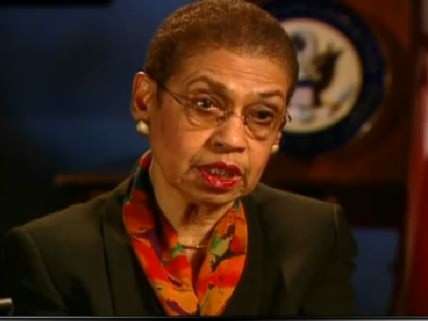Will the Rider Aimed at Stopping Marijuana Legalization in D.C. Actually Do That?

As I noted earlier today, the omnibus spending bill that Congress plans to pass this week includes a rider aimed at blocking marijuana legalization in Washington, D.C. But Eleanor Holmes Norton, the District's nonvoting delegate in Congress, questions whether the rider will actually accomplish that goal. The spending restriction, introduced by Rep. Andy Harris (R-Md.), says:
None of the funds contained in this Act may be used to enact any law, rule, or regulation to legalize or otherwise reduce penalties associated with the possession, use, or distribution of any schedule I substance under the Controlled Substances Act (21 U.S.C. 801 et seq.) or any tetrahydrocannabinols derivative for recreational purposes.
House Appropriations Committee Chairman Hal Rogers (R-Ky.) claims this rider "prohibits both federal and local funds from being used to implement a referendum legalizing recreational marijuana use in the District." But that is not quite accurate, since the rider refers to enactment, not implementation.
By contrast, an earlier version of the Harris rider dealt with spending to "enact or carry out" legalization of any Schedule I drug. That difference could prove crucial, Norton says, because Initiative 71, the D.C. ballot measure legalizing marijuana possession, sharing, and home cultivation, "was enacted when it was approved overwhelmingly by voters in November." The initiative's elimination of penalties for specified marijuana-related activities is "self-executing," Norton says, requiring no additional legislation by the D.C. Council or by Congress. In other words, the event Harris seeks to prevent has already happened.
Harris and his allies might point out that Initiative 71 will not take effect until it survives congressional review, which does not begin until D.C. Council Chairman Phil Mendelson officially submits the measure to Congress. At that point, Congress has 30 legislative days to pass a joint resolution rejecting the initiative (a resolution that requires the signature of a president who opposes interfering with the District's marijuana policies). If Congress fails to pass a resolution during the review period, the initiative takes effect automatically.
Since this process of submission and review entails some use of public money, wouldn't it be blocked by Harris' rider? Maybe not. There is a difference, after all, between "enact[ing]" a measure and making it effective. A law passed this year might not take effect until next year, but that does not mean it was not enacted this year. The Harris rider only bars enactment of Initiative 71, Norton says, and it's too late for that.
That seems like a pretty strong argument to me, since the District of Columbia Home Rule Act says a ballot initiative "shall take effect" at the end of the review period unless a resolution of disapproval has been enacted by then. If Congress does pass a resolution and the president signs it, the resolution "shall be deemed to have repealed" the initiative. You cannot repeal a law that has not already been enacted. Harris claims his rider "prevents the ultimate enactment of the ballot initiative," but that seems like a stretch.
If Norton is right, the Harris rider will not stop Initiative 71 from taking effect. Congress could still block it with a resolution of disapproval next year, but that task would be considerably harder than tacking an amendment onto a must-pass spending bill at the end of a legislative session.
The Harris rider clearly will prevent the D.C. Council from creating a system for licensing and regulating marijuana businesses, since that would require new legislation. That means homegrown marijuana will be the only legal source, so cannabis consumers who want to stay within the law but are not up to cultivating plants will have to cultivate friends who are.


Show Comments (19)